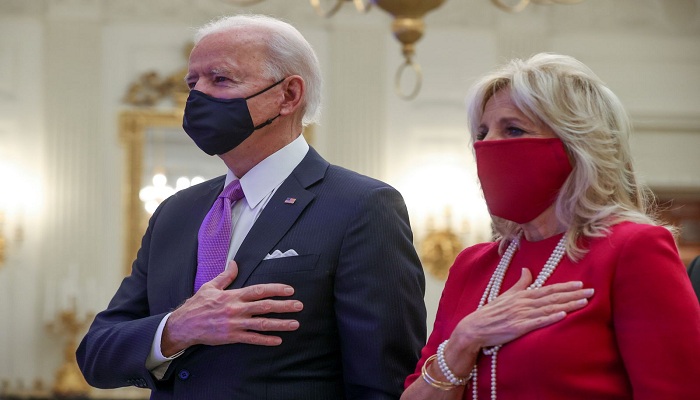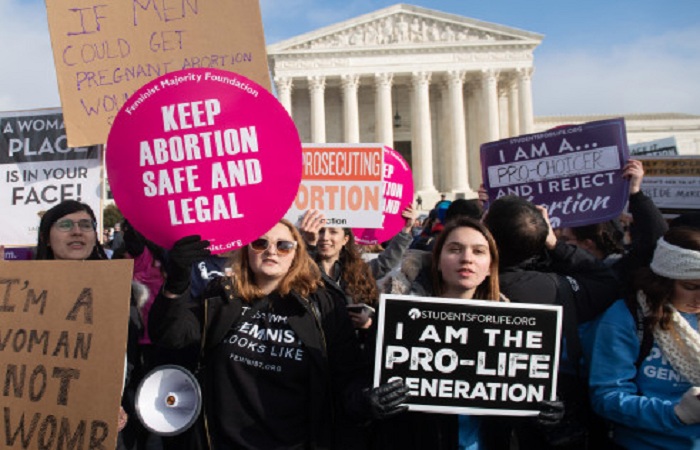US President Joe Biden vowed to reset Donald Trump’s ‘America First’ policy and focus on international diplomacy.
United States President Joe Biden took office in January on a promise to trade in the “America first” approach of his predecessor, Donald Trump, for a diplomacy-heavy, human-rights-led foreign policy.
As Biden marks his first 100 days in the White House this week, observers say his administration has taken several steps towards that goal including re-engaging with a number of international organisations and pressing for multilateral cooperation on global issues, such as climate change.

“Biden’s first 100 days pretty much came as advertised,” said PJ Crowley, the former US assistant secretary of state for public affairs under President Barack Obama.
Crowley pointed to the Biden administration’s tough line on China, its efforts to re-engage with Washington’s European allies, and its ongoing negotiations for a return to the Iran nuclear deal, which Trump unilaterally withdrew from in 2018, as examples of the shift.
US health dept announces new rules for prescription of opioid treatment
But while Biden has a wholly different style from Trump, his foreign policy has not been a “wholesale rebuke” of his predecessor, Crowley said.
That has garnered criticism from segments of the Democratic Party, who have urged Biden to take more progressive stances on a number of issues including US relations with Saudi Arabia, a low US refugee admissions cap, and arms sales to the United Arab Emirates and Egypt.
Here are some of Biden’s major foreign policy moves over his first 100 days
Afghanistan
On April 13, Biden announced the US would withdraw all remaining US troops from Afghanistan by September 11, the 20-year anniversary of the 9/11 attacks that precipitated the US invasion of the country.
Afghan Taliban shows concerns over US proposal
Biden pushed back a May 1 withdrawal deadline reached between the Trump administration and the Taliban, and his plan has been hailed by advocates who have long called on the US to end its so-called “forever wars”.

But critics have questioned whether the withdrawal would lead to renewed violence, leave the Afghan government ill-equipped to hold onto territory, and make a peace agreement between the government and the Taliban more elusive.
China
The Biden administration has increasingly made competing with China and countering Beijing’s economic and military assertiveness a top priority, while promising a more nuanced approach that involves cooperation wherever possible.
While the US has continued to sanction Chinese officials for human rights abuses, impose tariffs in an ongoing trade dispute, and build regional alliances to counter Beijing, Biden administration officials traded barbs with their Chinese counterparts during an inaugural meeting in Alaska in March.
In an opening statement, US Secretary of State Antony Blinken voiced “deep concerns with actions by China, including in Xinjiang, Hong Kong, Taiwan, cyber attacks on the United States, and economic coercion toward our allies”.
His Chinese counterpart Yang Jiechi then accused the US of “long-arm jurisdiction and suppression” and said many Americans have “little confidence in the democracy of the United States”, an apparent reference to storming of the US Capitol by pro-Trump rioters in January.
Still, Chinese President Xi Jinping participated in a US-hosted climate summit last week, indicating the leaders are willing to work with each other on some global issues.
Latin America
Biden’s promise to reset Trump-era policies at the southern border with Mexico have also been ad hoc amid a surge in migrant and asylum seeker arrivals, the vast majority from Central America.
The Biden administration ended Trump’s so-called Remain in Mexico policy, which required asylum seekers to stay in Mexico often in makeshift camps set up along the border while their US asylum claims are processed. He also ended agreements with El Salvador, Guatemala, and Honduras that allowed US authorities to deport asylum seekers who passed through one of those countries on their way to the US and send them back.
Biden admin sanctions Guatemala officials ahead of important meeting
Nevertheless, the Biden administration continues to use Title 42, a Trump-era public health policy that allows authorities to expel most migrants at the border during the COVID-19 pandemic, though Biden has exempted unaccompanied minors.
Biden also faced swift rebuke for announcing he would not make good on a campaign promise to lift the historically low, Trump-era refugee admissions cap of 15,000. After widespread backlash, the administration said it would announce a higher cap on May 15.
Russia
The Biden administration has twice imposed sanctions against Russia, first for the alleged poisoning and imprisonment of opposition leader Alexei Navalny and then for a raft of allegations including US elections meddling and hacking of an array of US federal agencies.
Biden has also taken a more confrontational tone with Russian President Vladimir Putin for his crackdown on dissent and build-up of Russian troops along the Ukrainian border, notably confirming that he believed Putin to be a “killer” in an interview in March.
Russian prosecutors seeks opposition leader jail term
Biden has offered to meet Putin for a summit in a European country in the coming weeks, although it remains unclear if that meeting will happen.
Yemen
In February, the Biden administration announced an end to US support for offensive operations carried out by a Saudi Arabia-led military coalition fighting Houthi rebels in Yemen, as well as any “relevant arms sales”. The US has not provided concrete details of how this will work, however.
No military solution to the conflict, Blinken told UN’s Yemen envoy
Biden officials are pushing for a diplomatic solution to end over six years of war in Yemen, which has led to a dire humanitarian crisis, and in its early days, the Biden administration lifted a Trump-era designation of the Houthi movement as a Foreign Terrorist Organization (FTO), which observers said could hinder aid deliveries.
Saudi Arabia and UAE
Before he was elected, Biden promised to “reassess” the US-Saudi relationship.
While Biden’s approach to the Gulf kingdom signals a shift from Trump, who unequivocally backed Saudi Crown Prince Mohammed bin Salman, his administration has also been criticised for not sanctioning MBS after a US intelligence report directly linked him to the killing of journalist Jamal Khashoggi.
Polish writer charged over comments on Biden and US election outcome
Biden has also been criticised for proceeding with a $23bn, Trump-era arms sale to the United Arab Emirates, also a member of the coalition fighting in Yemen. The sale includes F-35s, drones and other advanced equipment that critics say could further put Yemeni civilians at risk.
Iran
Biden has also sought a return to the Iran nuclear deal, an agreement reached under the administration of Obama, his former boss, that saw Tehran curtail its nuclear programme in exchange for sanctions relief.
Trump withdrew from the deal, which was opposed by Saudi Arabia and Israel, in 2018 and instead imposed a campaign of “maximum pressure” on Tehran.
US imposed sanctions on Iranian-Iraqi businessman over support of Quds Force
Tehran and Washington had been stuck in a deadlock over who will make the first move in returning to the deal, but indirect talks in Vienna that include the other parties to the agreement – the UK, France, Germany, EU, China and Russia are ongoing.
Israeli-Palestinian conflict
On the Israeli-Palestinian conflict, the Biden administration has signalled perhaps the most openness to maintaining Trump-era policies.
While Biden has renewed funding to the UN agency for Palestinian refugees (UNRWA), he has also made it clear he will not reverse Trump’s relocation of the US embassy to Jerusalem or his recognition of Israeli sovereignty over the occupied Syrian Golan Heights.
Biden administration officials also have said they plan to build on Trump-brokered normalisation deals between Israel and the UAE, Bahrain, Sudan and Morocco, which drew condemnation from Palestinians.



